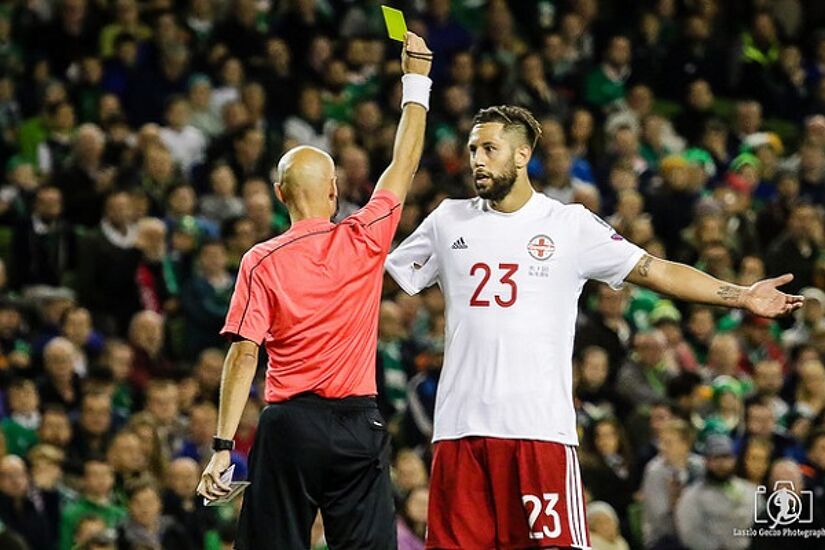It says in the papers and the podcasts: GAA, gamesmanship and Georgia (September 5th 2017)

Credit: Laszlo Geczo (ETPhotos)
Match-going fans listening to Newstalk en route to Friday’s fixtures were treated to Ger Gilroy questioning why the televised clash between Shamrock Rovers and Cork City preceded any mention of the All-Ireland Hurling Final in Richie McCormack’s news round-up.
McCormack had been explaining the results required for the Leesiders to clinch the league title on the night. While Gilroy was extracting the urine somewhat with his ‘complaint’, this was a telling example of the ‘Grab All Association’ attitude: ‘why aren’t we on firsht,’ ‘the game of the people’ et cetera.
There’s no doubt that Sunday’s hurling match is a big deal in Irish sport; or that interest inter-county hurling exceeds interest in Irish club football many times over. However, when one game is starting on telly in about 40 minutes and the other one is 40-plus hours away, perhaps ‘de gah’ lads could cut Bohs fan Richie some slack.
The GAA’s preferred method determining its champion team, its ‘championship’ if you will, is a knock-out competition played, as far as possible, on neutral grounds. This generates great drama in the form of big matches, in front of sell-out crowds, with a whole season on the line.
However, the corollary of this is that it often provides little in the way of news. There are far fewer fixtures and no league tables or ‘permutations’ to explain, in contrast to football’s round-robin, home-and-away structure.
Having doubled down on his ‘Cup Final’ talk last week, Stephen Bradley let John Caulfield throw the brickbats in the run up to the above-mentioned game. The two bosses have been sparring verbally since March, and Caulfield upped the ante in the last week by decrying Rovers’ 'gamesmanship.'
The Sun were only too delighted to highlight his fairly inflammatory statement that 'there are hard men in this league … then there are those who pretend to be hard.'
The ongoing nature of the bad-tempered exchanges was obvious from the headline 'Feud for Thought' in Friday’s Star, while the Mirror’s choice of 'Brad Blood' emphasised that the Rovers boss was as much of a perpetrator as he was a victim.
Unfortunately, for the tabloids, Bradley seemed to want to shut the controversy down, dismissing the various disputes between himself and the Cork manager as 'handbags and lipstick.' JC’s view on whether these are suitable accoutrements for a 'hard man' are as yet unrecorded.
Saturday’s Irish Times provided a surprising amount of interesting reading for Irish football supporters with Richie Sadlier discussing youth development, Emmet Malone comparing Georgian domestic football to our own, and Patrick Freyne interviewing Eamon Dunphy.
(Note: Patrick Freyne the journalist is not to be confused with Patsy Freyne, the elegant Cork City midfielder who won an FAI cup medal in 1998.)
However, Eamon Dunphy the TV pundit is the very same person as the ineffective Shamrock Rovers midfielder who won an FAI Cup medal in 1978. In spite of this, the interview tells us that Eamo’s sporting career finished in 1977. Sadly, the fact that the Dunph’s early dalliances with controversialism involved slaughtering the League of Ireland in print also went unmentioned in an otherwise excellent piece.
Georgian football’s parallels with our own situation were put under the microscope by Emmet Malone, although even they seem to have more money than we do. Of particular interest was the fact that the government and local authorities seem to subsidise clubs and keep them in business. A veritable nation of Sporting Fingals!
Average salaries in the Georgian league hover between €1,000 and €3,000 per month; while their 2017 league winners had a budget of €2.1 million. Those figures are slightly larger than here, and I’m fairly certain that the money goes further in Georgia. That Georgian clubs are able to sustain these figures with crowds that lag behind our own, and gate income that is even further back still, highlights the importance of non-matchday income for all football clubs.
Of course, one method of generating such income is to develop footballers. This is at least part of the motivation for the LOI’s expanding under-age structures. A point ignored by Richie Sadlier as he criticised the fact that these competitions do not include “elite-level” schoolboy clubs. Sadlier is referring to the DDSL.
But the problem here is that playing in a local county/city/district league is not an 'elite-level.' Particularly when these clubs do not run senior teams in national competitions. UEFA categorises football clubs in order to determine the level of compensation and solidarity payments due to them for the development of young players.
There are no Category 1 clubs outside England, France, Germany, Holland, Spain and Italy; the only Category 2 clubs in this country are the Premier Division of the LOI. DDSL clubs are Category 4. Thus, by bringing the senior and schoolboy games into alignment, the amount of compensation that comes into Irish football can be increased.
Also, while Sadlier may have a point about the prevalence of short-termism in the LOI, his claim that the League, as a whole, lacks 'a track record in youth development' is a bit harsh. Eight of the Irish-born players in the Euro 2016 squad had passed through a League of Ireland club, compared to seven who had not. Three of this seven were ex-DDSL.
When Harry Arter was describing a typical Irish-born ROI international last week he referenced local clubs and the League of Ireland. Of course, most of these players will have started out with a schoolboy side, but the traditional Dublin clubs are not successfully sending players straight across the water like in the past.

